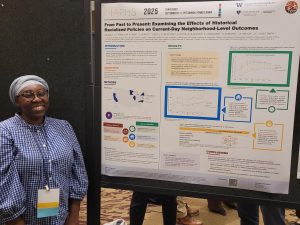
Pamela Bonsu, a Health Services PhD candidate at the University of Washington, has been recognized with a poster award at the 2025 Interdisciplinary Association of Population Health Science (IAPHS) Annual Conference. Her research with fellow Health Services PhD candidate Angela Chen, “The Effects of the Interstate Highway System as a Racialized Policy on Downstream Socioeconomic Factors: A Rapid Literature Review,” explores how one of the most ambitious infrastructure projects in U.S. history continues to shape community health and equity today.
The Federal-Aid Highway Act of 1956 routed highways through many thriving urban neighborhoods of color under the banner of “urban renewal” and urban redevelopment programs. While historians and community advocates have long highlighted the harms of this approach, Bonsu and Chen’s study systematically reviews the scientific literature on how highway placement has influenced long-term sociodemographic and socioeconomic outcomes.
“Highway development has often been discussed as an engineering achievement, but less attention has been paid to its role in shaping inequities in health, wealth, and opportunity,” said Bonsu. “Our study highlights the need for continued interdisciplinary research to fully understand these long-term effects.”
Bridging gaps in the evidence
The rapid review synthesized studies published between 2009 and 2024 that measured highways as a longitudinal exposure and assessed outcomes such as residential demographics, educational access, food environments, health care access, household income, and wealth.
Findings indicated the impact of highways varied across historical narratives, observational studies, and simulation studies, showcasing a range within empirical scholarship. While socio-historical accounts emphasized the displacement of historically underserved populations, especially Black and Mexican American communities, most statistical studies focused on broader regional effects and often did not account for racialization. The divergence underscores the need for new approaches that explicitly integrate race-conscious frameworks into population health research.
“Pamela’s and Angela’s recognition is well-deserved,” said Peggy Hannon, professor and interim director of UW’s Health Services PhD program. “Their work shines a light on how historical policy decisions can have long-term impacts on disparities, and it demonstrates the rigorous, equity-focused inquiry our students are bringing to the field.”
Collaboration and support
The project was conducted in collaboration with colleagues from the Department of Epidemiology and the Center for Studies in Demography and Ecology at UW, as well as the Departments of International Health and Health Policy and Management at Johns Hopkins University.
This research was supported by a grant from the National Institute on Minority Health and Health Disparities, with additional support from a Eunice Kennedy Shriver National Institute of Child Health and Human Development research infrastructure grant (P2C HD042828) to the UW Center for Studies in Demography & Ecology.
A model for future scholars
Bonsu and Chen’s recognition at IAPHS 2025 not only honors their contributions but also underscores the University of Washington’s role in preparing the next generation of public health leaders.
“As population health challenges become more complex, students like Pamela and Angela demonstrate the power of combining rigorous methods with a commitment to equity,” said Health Systems and Population Health Department Chair Megha Ramaswamy. “It’s exactly the kind of scholarship that inspires change.”
For prospective students, Bonsu and Chen’s award signals the unique opportunities available at UW to engage in interdisciplinary, socially impactful research. By tackling pressing issues such as these, UW doctoral students are advancing science that can guide policy, improve equity, and create healthier communities.